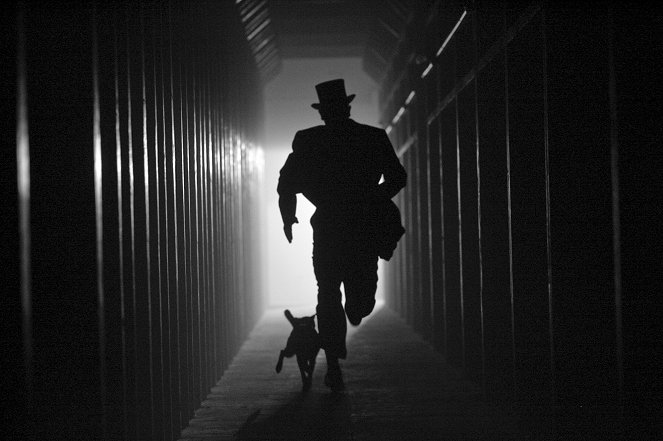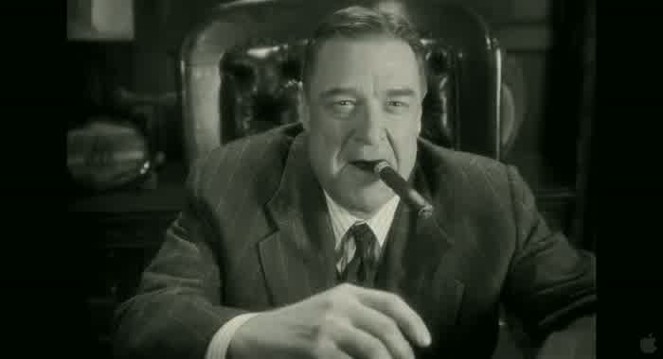Directed by:
Michel HazanaviciusScreenplay:
Michel HazanaviciusCinematography:
Guillaume SchiffmanComposer:
Ludovic BourceCast:
Jean Dujardin, Bérénice Bejo, John Goodman, James Cromwell, Penelope Ann Miller, Missi Pyle, Beth Grant, Ed Lauter, Elizabeth Tulloch, Ken Davitian (more)VOD (1)
Plots(1)
Hollywood 1927. George Valentin (Jean Dujardin) is one of the silver screens reigning idols instantly recognisable with his slim moustache and signature white tie and tails. Young dancer Peppy Miller (Berenice Bejo) is vivacious and good-humoured, with an incandescent smile and a flappers ease of movement. Peppy first crosses Georges path at his film premiere and then as an extra on his latest film. When talking pictures become the new rage in Hollywood, George wants no part of it. But by 1929 the studio is preparing to cease all silent film production and George faces a choice: embrace sound, like the now rising star Peppy, or risk a slide into obscurity. The Artist is a heartfelt and entertaining Valentine to classic American cinema. Mixing comedy romance and melodrama. The Artist is itself an example of the form it celebrates: A black-and-white silent film that relies on images actors and music to weave its singular spell. (Roadshow Entertainment)
(more)Videos (37)
Reviews (12)
Playful and in love with film. If it hadn't forcefully slid into the existential realm and screamed so boldly about "silent" emotions in the last act, The Artist would have been the daredevil of the year and now rightfully collecting its laurels. As it is, I can't escape the feeling of a slightly desired gradation that works a bit less in this form than it could, but in the end, I still have to praise it. The main couple shines in every smile or dance, period films force me into nostalgia, and the retro soundtrack works so perfectly that I devoured the transformation into the twenties to the last frame. As a whole, however, due to the aforementioned, only 75%.
()
Who would have thought that a silent film can astonish me even at a time when talkies are the norm and we’re seeing the rise of 3D movies? In fact, it is an absolutely beautiful throwback and homage to the film of the past. And this is what the very imaginative story of this movie is based on. Well, I have to admit that although Jean Dujardin seemed a bit crazy to me in his earlier films, here he showed that he’s a master of his craft even without sound. Perhaps I will never forget the scene where he appears at the ball, frowns and looks for something. There are so many emotions in that face that it can’t even be described. At that moment you’ll just fully understand what that means. And you’ll find out you can do without any lines or sound without a problem. The same goes for the final scene. I couldn’t imagine a more beautiful dance number. And shot in one go? Oh my God, is someone still filming such scenes these days? Hats off, for such a film experience does not occur every day. And that’s probably a good thing; thanks to this, this film gains a lot of uniqueness, which it will never lose.
()
I wasn’t particularly enthused about this. I suspected that the film would not be quite right and that's why I postponed watching it. Then, just to be sure, I watched it again. It's not an entirely bad film, and if it inspires even a fraction of viewers to discover real silent films, then it has served its purpose. On the other hand, the story is just a continuation of the bad aspects of Singin' in the Rain, and I have a huge problem with that. The heroes of yesteryear can be none other than the combination of Rudolph Valentine, Douglas Fairbanks, and John Gilbert. Fortunately, there's also the cheerful studio owner and anyone from those legendary head honchos to William Randolph Hearst (played by the excellent John Goodman). The film also features a cleverly trained dog, believable sets, gorgeous costumes, a near-perfect final dance number, and some hope for a better tomorrow. What is somewhat deceptive is the sound nightmare and especially the 1936 song used as background for 1931. Equally problematic and redundant is the conveyance of actual footage from The Mark of Zorro (1920). The question thus remains whether the story of silent film is really interesting just because that era is long gone.
()
The transition from the silent to the sound era was a major turning point in the world of cinema, and for many actors and directors who didn't want to adapt (or couldn't), it meant the end of a stellar career. This film nicely shows the tense situation of the late 1930s and very credibly and elegantly portrays the atmosphere and conditions in the film world at the time. As for the actors, I was satisfied, even if there's not much to say, it's all accompanied by apt and funny gestures. And the little dog was really cute. The music was a great second to the picture, as was the very sparse (but purposeful) use of sound. In short, a film that is a quality piece on all its levels, which is interesting mainly for its conception and technical execution.
()
I wasn't particularly impressed with the previous effort of the director and the two main actors, Agent 117, but I couldn't deny one thing - it really looked like something from the (roughly) 1960s. In The Artist, the filmmakers have managed to repeat this and to enhance it with a classic, but really nice story full of humor and nostalgia. The illusion that one is really watching a film from 192? is almost perfect (although anyone who has seen the Argentine The Aerial will probably not be impressed). The cinematography, the music, all the details, the central couple (Douglas Fairbanks and Mary Pickford) acting and dancing like a dream, John Goodman, who I liked the most, James Cromwell... Everything's perfect. The Artist is an incredibly clever film. If I wanted to reproach it for anything, I would have to reproach all the old films it is dealing with... Which would be useless.
()
Gallery (85)
Photo © Warner Bros. France



Ads